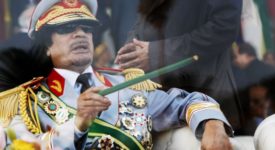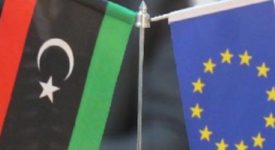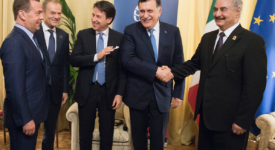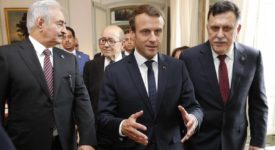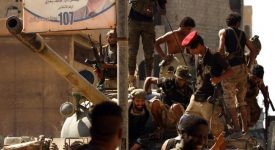Field Marshal Haftar, Libya’s latest and putatively greatest strongman, has been on the move again. On 3 April, his Libyan National Army (LNA) began expanding westwards along Libya’s coastal road through the Nafusa mountains to the town of Gharyan. The LNA’s rapid capture of the town was easy, but nonetheless an important step on the road to the Libyan capital of Tripoli. Haftar’s momentum means he is on the brink of realizing his dream of unifying the country under this control.
But Haftar’s day has not yet arrived. Unsurprisingly, the LNA’s advance has provoked a counter-mobilization from western Libyan forces that had already banded together in preparation for such an escalation. The UN-backed Government of National Accord (GNA) is readying whatever air and manpower it has to defend the capital. The response of the city of Misrata, which has already pledged troops to help defend the capital, will be the key factor in the GNA’s ability to protect its position. All this means that Libya now teeters on the brink of another civil war. The UN has lost all control of events – UN Secretary General Antonio Guterres landed in Tripoli also on 3 April, but given recent events, his effort at shuttle diplomacy between Haftar and the other Libyan factions already seems hopeless.
Worse, despite appearances, Haftar does not have the power to bring meaningful stability to the country. He cannot do good on all the promises he has made either to his Libyan counterparts or to the international partners to whom he has promised preferential access and authoritarian stability. Despite the effective branding, Haftar is not actually in control of an army in the traditional sense of the term. The LNA is a shaky alliance between various militias of tribal, religious and local interests around a core of more traditional forces (who themselves are highly compromised by Salafist components.)
Europeans urgently need to step up their own response to Haftar’s march. Together, they have ability to stand in the way of the LNA and help preserve the fragile stability in Libya. Europeans have direct security and energy related interests in Libya’s stability that Haftar’s recent efforts put at risk. Their immediate priority should be to facilitate a ceasefire and a peaceful National Conference process that can produce a political roadmap for building stability in Libya. Such a roadmap would offer Haftar a negotiated route to participation in the Libyan government rather than allowing him to dictate terms. The only question is whether they will use that capability.
Haftar has often made his grandiose ambitions clear over the previous four years, but those years have also shown that even if he realizes them, they are far more likely to result in further conflict than stability. If Haftar remains free to continue escalating the situation and dictating the political process without any meaningful response from international actors, then renewed violence seems almost inevitable. This would set Libya’s transition back by years and create a new body of destabilizing threats to the region and across the Mediterranean.
‚The March of Haftar: Why Europeans Should Stand in the Way of the Libyan National Army‘ – Commentary by Tarek Megerisi – European Council on Foreign Relations / ECFR.
(The Commentary can be downloaded here)

